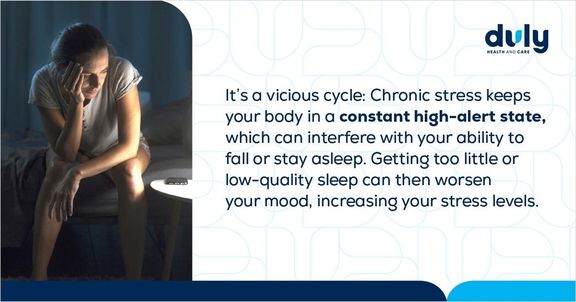Whether it’s a busy week at work, an argument with a friend, or crunchtime before a major presentation, we all find ourselves in stressful situations.
Stress is your body’s response to a challenging or difficult situation, and a small amount of stress can actually be a good thing. Stress helps us accomplish daily activities and can improve our ability to problem-solve. It’s also what’s responsible for the body releasing the hormones needed for the “fight or flight” response, which makes you prepared to protect yourself from harm.
In many cases, stress is acute, meaning it’s a short-term reaction to a new, exciting, or dangerous situation. But when stress persists for several weeks or months, it is considered chronic. Chronic stress can put you at an increased risk for conditions like heart disease, diabetes, depression or anxiety, low libido (sexual desire), upset stomach, migraines, or menstrual problems. If you already have a health condition, chronic stress can make it worse.
Fortunately, here are 7 ways to manage stress and prevent it from negatively affecting your health.
1. Get Your Zzzs
Problems with stress and sleep go hand-in-hand.
Most adults in the US should aim to get about 7 to 9 hours of sleep each night. There are many ways to improve your sleep, such as:
Taking a cool shower or bath before bed, and ensuring that your bedroom is between about 60 to 67 °F.
Stopping screen time an hour or two before bed.
Going to bed around the same time every night and waking up at the same time every morning — even on weekends.
Avoiding caffeine, alcohol, nicotine, and big meals before bedtime.
Getting up if you can’t sleep. After 30 minutes of trying unsuccessfully to fall asleep, get up and do something relaxing until you’re sleepy.

2. Stay Active During the Day
When you are physically active, your body produces chemicals called endorphins. Endorphins are known as natural painkillers, but they have other jobs, too. They can help you sleep, which can then decrease stress. If you’re in a current state of stress, endorphins calm your body down so that you can cope.
The American Heart Association recommends that most healthy adults should get at least 150 minutes of medium-intensity aerobic activity (like brisk walking) or 75 minutes of higher-intensity activity (like running) every week. Additionally, they should perform muscle-strengthening exercises (like lifting weights) at least twice a week.
You don’t need to fight chronic stress on your own. Contact your primary care provider at Duly Health and Care.
3. Try the Mediterranean Diet
Chronic stress can make you crave high-calorie, sugar-filled comfort foods. However, these foods aren’t very nutritious and won’t improve your stress levels.
Foods high in dietary fiber and omega‑3 fatty acids, and fermented foods (e.g., plain yogurt) are helpful for fighting stress and anxiety. These overlap with the foods that are part of the Mediterranean diet, which is one of the top-ranked diets in the US.
The Mediterranean diet is full of plant-based, minimally processed foods and generally includes:
High amounts of fruits, vegetables, potatoes, beans, grains, nuts, and seeds
Low to moderate amounts of eggs, dairy products, fish, and poultry
Olive oil, as the main source of fat
4. Take a Break From Social Media
You don’t need to delete your accounts or give up Facebook for months at a time. Just a short hiatus can do the trick. Even one week away from social media can reduce symptoms of anxiety and depression — which are both associated with chronic stress.
5. Say “No”
It can be tempting to say “yes” to everything that comes your way — but you need to set limits. Make a list of everything you have committed to (both work and non-work) for the next few weeks or months, and see if there is anything that isn’t absolutely necessary. Then, give yourself a limit on how many activities or hours you can devote to new things. Once you hit your limit, remember that it’s totally fine to say “no.”
6. Practice Mindfulness
Mindfulness describes being completely aware of — and accepting without judgment — what is happening in a particular moment within your body and surroundings. It is a known stress reliever, and it works by influencing two of the stress pathways in your brain, which changes the activity and structure in the areas that control emotion and attention.
There are many ways to practice mindfulness, such as meditation, yoga, and even art therapy.
Also Read: 5 Ways to Build Mindfulness Into Your Everyday Life
7. Reach Out for Support
Your social circle may be an untapped resource. A trusted friend or family member can lend you an ear, and give you advice if they went through a similar situation. Once they are aware of your chronic stress, they may be able to do things to help, like offer to take certain things off your plate.
Just be careful to avoid a “stress olympics” situation. While it can be helpful to hear from others who have gone through something similar, it can just compound stress if you and your friends start one-upping each other about who is more stressed.
You may also benefit from working with a mental health professional, like a psychologist. They can help you identify what stresses you out and discover new strategies for coping that are unique to you.
Find Mental Health providers near you >
Health Topics:








